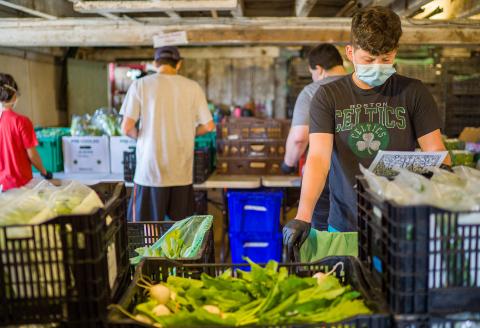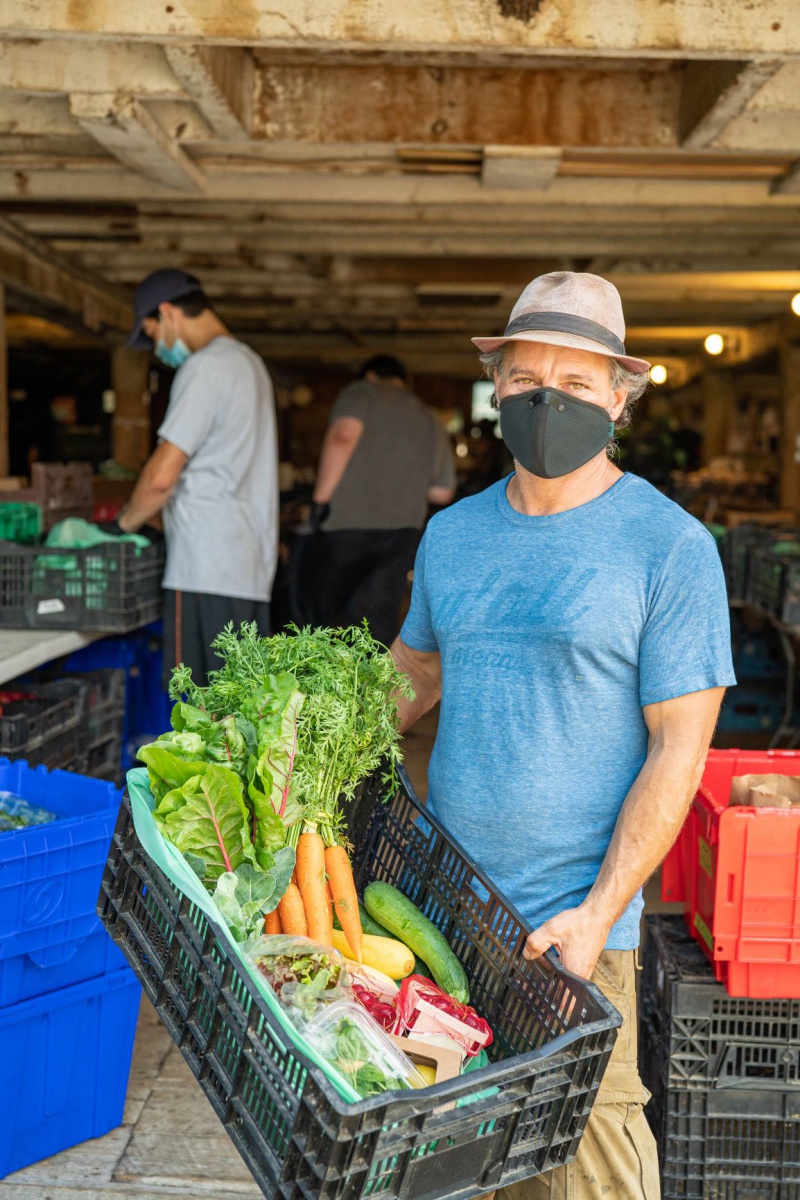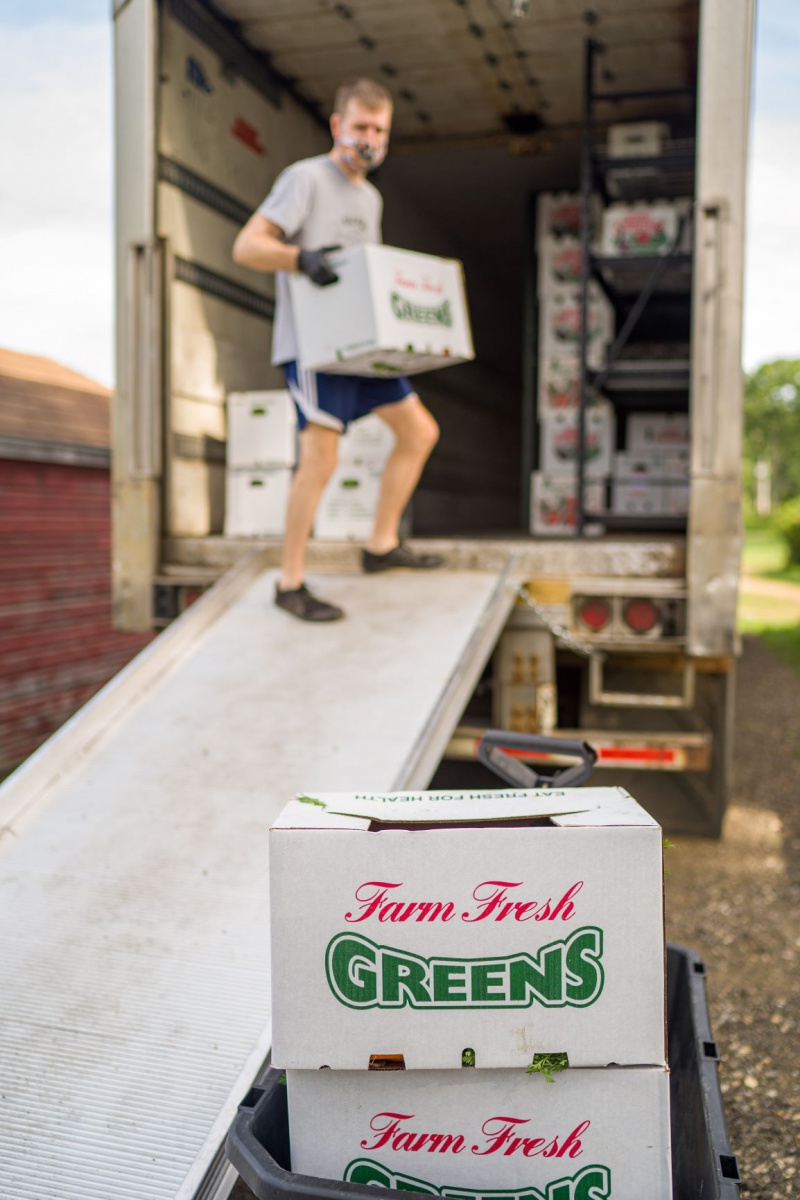UNH Extension Provides Support to New Hampshire Farmers Adapting to COVID-19

First, the late winter farmers markets were canceled. Then restaurants shut down. When COVID-19 hit New Hampshire, the state’s stay-at-home order quickly posed a threat to farmers’ livelihoods.
Andre Cantelmo of Heron Pond Farm in South Hampton recognized that the situation presented opportunities alongside its challenges. “We had two choices: we could figure out how to adapt and distribute even more food locally or we could hunker down and wait for this to pass and get back to what we were doing before,” he explains.
Cantelmo went with the first option. Because he did, and with some guidance from Extension, his farm is one of many local agricultural businesses successfully weathering a challenge unlike any this region has ever experienced.
Thinking Outside the Box
Back in 2015, Cantelmo decided to pool resources with three other farmers on the New Hampshire Seacoast to form the Three River Farmers Alliance to jointly deliver their vegetables to local restaurants, grocers, hospitals and other institutions. When it comes to large-scale distribution, he explains, “It’s just not economically viable for a small farm to pull off.”
Over the past five years the quartet built up a robust network with an online marketplace for fresh, local food from more than 50 farms and food producers. But when the pandemic altered the dining and retail industries, the alliance knew they needed to rethink their business model.
“We decided to take the wholesale model and make a home delivery retail side of the business. There was no way to get our product to our people and it turns out this was a necessary step for not only producers but also the customers,” Cantelmo says.
An idea took root. The name? Veggie-Go. The method? Refrigerated box trucks packed with locally grown vegetables, local meat and dairy products destined for personal homes, rather than businesses. Cantelmo and his partners swiftly set up an online ordering system and expanded distribution service to include delivery to some 900 households each week, serving 63 towns in New Hampshire, Maine
and Massachusetts.
Customers register for an online account for free. Each order must tally to a minimum of $25 and there is a $10 delivery fee per order (or $5 for pick-ups).
Because of federal regulations, low-income families who are eligible for the Supplemental Nutrition Assistance Program (SNAP) must pay in-person and cannot be charged a delivery fee. In response, the alliance has set up an option for customers to make a donation with their order to cover some of the costs of delivery to SNAP customers, and they can also donate to an emergency food fund for families in need.
Between monetary and food donations, in just over three months the alliance had given away $40,000 worth of food. “Not only are we aggregating local food sales, we’re aggregating local food donations and helping them get distributed,” Cantelmo says.
Navigating Protocols
Each step of the way, Cantelmo knew he could rely on Extension if he had questions or needed guidance on agricultural business best practices, safety protocols or logistics. He reached out to Extension staff members to run ideas by them and see if there were aspects of the new model that he was not thinking about.
He read Extension’s daily COVID-19 updates and attended Extension’s webinars and farmers’ forums — Zoom sessions designed for farmers to discuss obstacles and come up with solutions.
“We’ve continued to get support from Extension’s food safety team and having the COVID-19 updates was really important,” he says.
Safety has remained at the forefront of operations. Cantelmo changed the layout of his farm stand and implemented limits on how many people could be in the stand at a time. The alliance has adopted social distancing norms for harvesting and packing. Crew members wear masks and remain vigilant about handwashing and sanitation.

Creating Spaces for Connection
For Extension’s agricultural team, life moved at warp speed at the start of the pandemic. Olivia Saunders, fruit and vegetable production field specialist in Carroll County, knew it would be important to share rapidly evolving information about the virus while creating new resources so that farmers could move forward with operations.
“Across all commodities — didn’t matter if you were a dairy farmer or a pick-your-own farm — they all needed to be making some sort of change, and that’s where the stress piece came in,” she explains. “Planning is done in the winter; seeds should already be in the mailbox by early spring and suddenly there were decisions that need to be made with immediacy. Normally, during March, April and May the plans have already been set.”
While working remotely, Extension specialists wrote blogs, gathered data, made phone calls and set up Zoom meetings. They created a daily FAQ e-mail to address COVID-19 concerns and hosted twice-a-week forums for farmers and members of the ag service provider industry, which included representation from nonprofit, state and federal organizations.
Traditional field and in-person meetings for growers, focused on timely production issues, were converted into an online format, which meant they could recruit speakers and producers from a much
larger geographical area.
Extension staff provided information and answers to questions about food safety, health of the labor force, new market opportunities and safe ways of conducting CSAs, farmers markets and pick-your-own operations. Specialists assisted producers with production, management and financial education tools. Staff continued to make solo farm visits for diagnostic consultations, using smartphones to video their observations and then relaying their advice digitally to farmers.
Extension also teamed up with the New Hampshire Department of Agriculture to gather farm listings from across the state to build an interactive farm products map, designed by Extension geospatial technology specialist Shane Bradt. In addition to food essentials like meat, produce and dairy, farmers can list other offerings like cut flowers, hay, compost, seedlings, soap, candles and more.
One centralized map makes it easy for farmers to connect directly with consumers while sharing the most up-to-date information about pick-up locations, delivery options, contact information, payment methods, product listings, purchasing incentives and food access programs.
Interpreting Laws
Seth Wilner, agricultural business management field specialist in Sullivan County, says Extension’s cohesive team approach to the COVID-19 response — under the direction of team leader Amy Papineau — was key to successfully communicating with farmers. Existing relationships with farms in every county, agency staff and agricultural organizations across the state meant that the infrastructure for this communication was already in place.
It was these relationships, he reiterates, that made everything possible.
One of the largest challenges came from regular output of complex rules and regulations. Wilner and agricultural business state specialist Kenesha Reynolds spent countless hours interpreting legal information and requirements from legislation and funding opportunities like the Families First Coronavirus Response Act, Paycheck Protection Program and Economic Injury Disaster Loan.
“Because growers trust us and didn’t have time to interpret new laws on their own, they turned to us. We read, we listened to webinars. We found out as much information as we could,” he says.
New legislation would pass but rules would lag by weeks. Some funds were distributed on a first-come, first-served basis. Eligibility requirements shifted. Whether working with the U.S. Department of Labor, federal organizations, state entities or lawyers, it became vital to know the right kind of questions to ask and how to pass that information along in a timely manner. “It was high pressure and hard,” he says.
When federal money from the CARES Act became available in each state, Gov. Sununu set up the Governor’s Office for Emergency Relief and Recovery (GOFERR) Committee. Data was needed to inform their allocations. Extension quickly swung into action, working with the New Hampshire Farm Bureau and New Hampshire Commissioner of Agriculture Shawn Jasper to help secure funding from the CARES Act. Within a 48-hour time span they developed, deployed and analyzed a survey and then created a report in order to procure $1.5 million for specialty crops and maple growers in New Hampshire. Extension also helped communicate about funding opportunities to the farmers.

Supporting Mental Health
Farming, Extension specialist Olivia Saunders says, is unique to many professions because it can be all-consuming, especially for multigenerational farming families and beginner farmers who may be pursuing the path alone. With all the added stress of the virus, Saunders saw an important need to generate awareness about mental health issues. Extension collaborated with the New Hampshire Farm Bureau to implement a campaign called Farming Together to provide resources and support for mental health.
“Farming becomes your identity; it’s everything you are. It’s your home, it’s your work, it’s your whole life. The question, ‘What if I fail, after this has been in my family for so long?’ is a heavy burden,” Saunders says.
The campaign’s overarching message to farmers? Reach out. Start a conversation. We’re here for you and other farmers are here for you.
Amy Franklin of Riverview Farm in Plainfield is grateful for Extension’s efforts to bring together farmers from across the state. “I think that checking in with each other, even if it is just to comment on these unprecedented times, can open a gateway between farmers to have a more meaningful conversation about experiences during the growing season and express any stress that has come with it,”
she says.
In other words, we’re all in this together.
